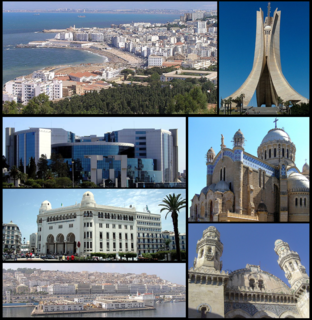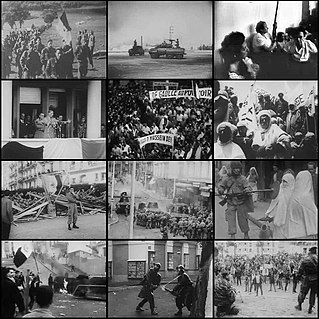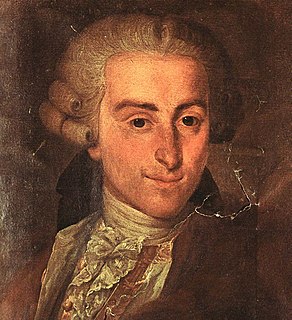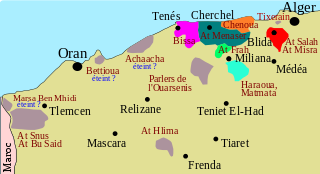Bathia | |
|---|---|
 | |
 | |
| Coordinates: Coordinates: 35°54′58″N1°50′21″E / 35.91611°N 1.83917°E | |
| Country | Algeria |
| Province | Aïn Defla |
| Time zone | UTC+1 (West Africa Time) |
Bathia | |
|---|---|
 | |
 | |
| Coordinates: Coordinates: 35°54′58″N1°50′21″E / 35.91611°N 1.83917°E | |
| Country | Algeria |
| Province | Aïn Defla |
| Time zone | UTC+1 (West Africa Time) |
World Off Bathia

Algeria, officially the People's Democratic Republic of Algeria, is a country in North Africa. Algeria is bordered to the northeast by Tunisia; to the east by Libya; to the southeast by Niger; to the southwest by Mali, Mauritania, and Western Sahara; to the west by Morocco; and to the north by the Mediterranean Sea. It is considered to be a part of the Maghreb region of North Africa. It has a semi-arid geography, with most of the population living in the fertile north and the Sahara dominating the geography of the south. Algeria covers an area of 2,381,741 square kilometres (919,595 sq mi), making it the world's tenth largest nation by area, and the largest nation in Africa, being more than 200 times as large as the smallest country in the continent, The Gambia. With a population of 44 million, Algeria is the ninth-most populous country in Africa, and the 32nd-most populous country in the world. The capital and largest city is Algiers, located in the far north on the Mediterranean coast.

Albert Camus was a French philosopher, author, dramatist, and journalist. He was awarded the 1957 Nobel Prize in Literature at the age of 44, the second-youngest recipient in history. His works include The Stranger, The Plague, The Myth of Sisyphus, The Fall, and The Rebel.

Algiers is the capital and largest city of Algeria. The city's population at the 2008 Census was 2,988,145 and in 2020 was estimated to be around 4,500,000. Algiers is located on the Mediterranean Sea and in the north-central portion of Algeria.

The Algerian War, also known as the Algerian Revolution or the Algerian War of Independence, and sometimes in Algeria as the War of 1 November, was fought between France and the Algerian National Liberation Front from 1954 to 1962, which led to Algeria winning its independence from France. An important decolonization war, it was a complex conflict characterized by guerrilla warfare and war crimes. The conflict also became a civil war between the different communities and within the communities. The war took place mainly on the territory of Algeria, with repercussions in metropolitan France.

French Algeria, also known as Colonial Algeria, was the period of French colonisation of Algeria. French rule in the region began in 1830 with the invasion of Algiers and lasted until the end of the Algerian War of Independence in 1962. While the administration of Algeria changed significantly over the 132 years of French rule, the Mediterranean coastal region of Algeria, housing the vast majority of its population, was an integral part of France from 1848 until its independence.

The National Liberation Front is a nationalist political party in Algeria. It was the principal nationalist movement during the Algerian War and the sole legal and ruling political party of the Algerian state until other parties were legalised in 1989. The FLN was established in 1954 from a split in the Movement for the Triumph of Democratic Liberties from members of the Special Organisation paramilitary; its armed wing, the National Liberation Army, participated in the Algerian War from 1954 to 1962. After the Évian Accords of 1962, the party purged internal dissent and ruled Algeria as a one-party state. After the 1988 October Riots and the Algerian Civil War (1991–2002) against Islamist groups, the FLN was reelected to power in the 2002 Algerian legislative election, and has generally remained in power ever since, although sometimes needing to form coalitions with other parties.

The Algeria national football team represents Algeria in men's international football and is governed by the Algerian Football Federation. The team plays their home matches at the 5 July Stadium in Algiers and Miloud Hadefi Stadium in Oran. Algeria joined FIFA on 1 January 1964, a year and a half after gaining independence. They are the current champions of the FIFA Arab Cup.

Aïn Defla (Arabic: ولاية عين الدفلى, is a wilaya in northern Algeria. It is located to the southwest of Algiers, the capital. Localities in Ain Delfa include Khemis Miliana, Miliana, Hammam Righa, Oued Zebboudj and Aïn Torki.

Giovanni Battista Sammartini was an Italian composer, violinist, organist, choirmaster and teacher. He counted Gluck among his students, and was highly regarded by younger composers including Johann Christian Bach. It has also been noted that many stylizations in Joseph Haydn's compositions are similar to those of Sammartini, although Haydn denied any such influence. Sammartini is especially associated with the formation of the concert symphony through both the shift from a brief opera-overture style and the introduction of a new seriousness and use of thematic development that prefigure Haydn and Mozart. Some of his works are described as galant, a style associated with Enlightenment ideals, while "the prevailing impression left by Sammartini's work... [is that] he contributed greatly to the development of a Classical style that achieved its moment of greatest clarity precisely when his long, active life was approaching its end".

The Algerian Football Federation (AFF); is the governing body of football in Algeria. It was formed in 1962 and was based in the capital Algiers. It has jurisdiction on the Algerian football league system and is in charge of the men's and women's national teams. Although an unofficial national team had played fixtures since 1958, the first recognized international took place in January 1963, some six months after independence. In 2021, twenty structures were added to the Algerian Football Federation. Algeria has to work with new players but has already qualified for AFCON 2021. AFCON stands for Africa Cup of Nations. Algeria has 17 players in French Ligue 1. The Algerian Football Federation is considered a member of FIFA.

Yei Evelyn Theodora Kate OzakiO'Yei or Theodora was an early 20th-century translator of Japanese short stories and fairy tales. Her translations were fairly liberal but have been popular, and were reprinted several times after her death.
Giuseppe Francesco Gaspare Melchiorre Baldassare Sammartini was an Italian composer and oboist during the late Baroque and early Classical era. Although he was from Milan, most of his professional life was spent in London and with Frederick, the Prince of Wales. He also had a younger brother, Giovanni Battista Sammartini, who likewise became a renowned composer.

The Kabyle people are a Berber ethnic group indigenous to Kabylia in the north of Algeria, spread across the Atlas Mountains, 160 kilometres (100 mi) east of Algiers. They represent the largest Berber-speaking population of Algeria and the second largest in North Africa.

Joseph Haydn wrote his Symphony No. 8 in G major under the employ of Prince Paul II Anton Esterházy in Spring 1761, in the transition between the Baroque and Classical periods. It is the third part of a set of three symphonies that Prince Anton had commissioned him to write – Le matin, Le midi and Le soir. He had given him as inspiration the three times of Day.

Bathia District is a district of Aïn Defla Province, Algeria.
Bathia Howie Stuart (1893–1987) was a notable New Zealand actor, singer, journalist, lecturer, film-maker and tourism promoter. She was born in Hastings, Hawke's Bay, New Zealand in 1893. She starred in the silent movie The Adventures of Algy alongside Claude Dampier.

Ashok Banthia, sometimes referred as Ashok Bathia or Ashok Bhatia, is an Indian actor and director associated with Hindi film, television and theatre actor. He is a NSD alumnus known for his roles in Australian TV miniseries Bodyline as Nawab of Pataudi Sr.

Anita Sharp-Bolster was an Irish-born American actress who appeared in 88 films and 12 TV series from 1928 to 1978. She was sometimes billed as Anita Bolster.

The Western Algerian Zenatic dialects are a diffuse set of Zenati Berber dialects spoken in north-western Algeria, west of the capital Algiers.

The COVID-19 pandemic in Algeria is part of the worldwide pandemic of coronavirus disease 2019 caused by severe acute respiratory syndrome coronavirus 2. The virus was confirmed to have spread to Algeria in February 2020. In December it was announced that Algeria intended to launch COVID-19 vaccinations in January 2021.